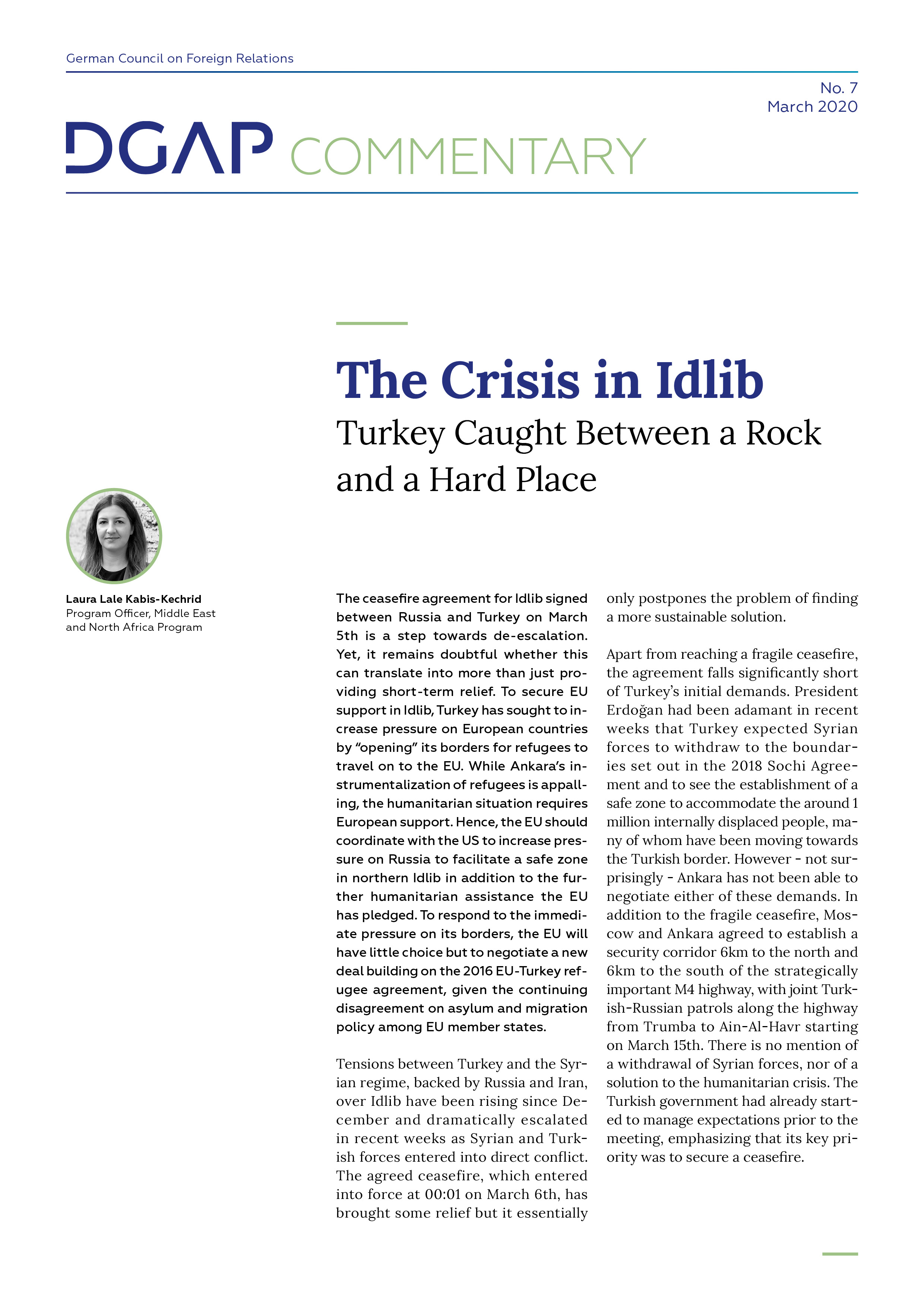Tensions between Turkey and the Syrian regime, backed by Russia and Iran, over Idlib have been rising since December and dramatically escalated in recent weeks as Syrian and Turkish forces entered into direct conflict. The agreed ceasefire, which entered into force at 00:01 on March 6th, has brought some relief but it essentially only postpones the problem of finding a more sustainable solution.
Apart from reaching a fragile ceasefire, the agreement falls significantly short of Turkey’s initial demands. President Erdoğan had been adamant in recent weeks that Turkey expected Syrian forces to withdraw to the boundaries set out in the 2018 Sochi Agreement and to see the establishment of a safe zone to accommodate the around 1 million internally displaced people, many of whom have been moving towards the Turkish border. However - not surprisingly - Ankara has not been able to negotiate either of these demands. In addition to the fragile ceasefire, Moscow and Ankara agreed to establish a security corridor 6km to the north and 6km to the south of the strategically important M4 highway, with joint Turkish-Russian patrols along the highway from Trumba to Ain-Al-Havr starting on March 15th. There is no mention of a withdrawal of Syrian forces, nor of a solution to the humanitarian crisis. The Turkish government had already started to manage expectations prior to the meeting, emphasizing that its key priority was to secure a ceasefire.
Turkey is stuck between a rock and a hard place. While Ankara has miscalculated its relations with Moscow, it has invested too much in Syria to just withdraw. At home, the government is facing immense pressure. Turkey is already hosting around 3.7 million refugees and the risk of more refugees entering the country is fueling widespread resentment. In addition, the rising death toll of Turkish soldiers is making it increasingly hard for the government to maintain public support for the offensive. Unlike Turkey’s previous incursions against Kurdish forces in northeastern Syria, which was widely considered necessary to protect national security, there is much less public understanding for the necessity to fight in Idlib. To manage the growing public dissatisfaction, Twitter was temporarily blocked in Turkey and expressions of protest under the slogan “no to war” (“savaşa hayır”) were banned in a number of cities.
The EU needs to recognize that the current horrific situation at the Greek-Turkish border is at least partly home-made
As a consequence, Turkey has sought support from NATO and the EU. On February 28th, a NATO emergency meeting was held at Ankara’s request. President Erdoğan and NATO Secretary General Jens Stoltenberg met again on March 09th. In addition, by “opening” its borders for refugees to travel on to Europe Turkey has sought to pressure European countries into providing support, not only with regard to refugee management in Turkey but also with regard to the situation in Idlib. However, there has been a reluctance to commit to concrete measures to help Turkey, whose policies and recurrent anti-Western rhetoric have disgruntled its Western partners.
While Ankara’s instrumentalization of refugees is unquestionably appalling, the humanitarian situation urgently requires European support. On June 29th and 30th, the EU will convene a fourth Brussels Conference on “Supporting the Future of Syria and the Region” – a lot can happen until then. While it is unclear how much Moscow can lean on the Assad regime at the end of the day, Russia’s military support and control of the airspace over Idlib is unquestionably crucial. Hence, the EU should coordinate with the US to increase pressure on Russia to facilitate a safe zone in northern Idlib. A de-escalation of the situation in Idlib will likely also help to decrease the pressure on the Greek-Turkish border. While there are plenty of good reasons to feel more than uncomfortable, the EU has little choice but to work with Turkey, given European countries’ inability to agree on migration and asylum policy. In addition to the further humanitarian assistance the EU has pledged, this will require a new deal with Turkey based on and learning from the flaws of the 2016 agreement. This also entails recognizing that the current horrific situation at the Greek-Turkish border is at least partly home-made.

